#superimposing narratives
Text
One thing I've been thinking about lately:
I don't think I've seen a single post about how queer-coded Demian (the silly Sinclair book) was — I mean yes it was weird and sometimes it felt like Sinclair was trying to get together with Demian's mom, Eva, but also the relationship between Sinclair and Demian is pretty intense too.
(Kept my comments because they're too stupid to leave out)

The only reason I could come up with for why this might be written like this is the war segment at the end — a lot of war is pretty gay on its own and an unfiltered straight view on the matter will still come across as pretty queer. However, other, non-war sections are equally gay. Herman, you got something you trying to tell us?

Anyways. This just made me curious about the future of Demian as a character in Limbus and I'm super interested where they'll take it. My interpretation is that Dante's clock hands only move when a character has one complete character arc, so that means Sinclair's is still incomplete. How'll the wrap that shit up? Let this religious trauma baby be happy pretty please 🥺🥺🥺
#limbus company#hermann hesse#demian#literary analysis#sinclair lcb#project moon#yep im definitely just superimposing my queer headcanons onto a straight narrative aren't I#i still don't know how to tag
25 notes
·
View notes
Text
everyone in sex & the city’s problems could be solved by gay sex. except for carrie. idk what her deal is.
#here’s where I’m at:#charlotte idgaf abt but she hates sucking dick#so. gay.#samantha & miranda should have CRAZY gay sex#BUT!#miranda and carrie is a special sort of end game#the narrative over and over superimposes them as one another’s most important person#like causally. which means it’s so there it doesn’t need stating.#and so. I would like to see it.#it won’t fix carrie & it will ruin miranda but I don’t care. me personally.#sex and the city#miranda hobbes
8 notes
·
View notes
Text
“Jon had never heard this tale before. "Which Brandon was this supposed to be? Brandon the Builder lived in the Age of Heroes, thousands of years before Bael. There was Brandon the Burner and his father Brandon the Shipwright, but—"
"This was Brandon the Daughterless," Ygritte said sharply. "Would you hear the tale, or no?"
He scowled. "Go on."
--Jon VI, ACOK
you know, whatever our feelings on jongritte, i think we can all appreciate the fact that jon is semi-canonically the kind of guy who pauses the movie to point out the historical references, while his girlfriend hits him with a pillow because man come on, it was just getting good!
#op#asoiaf#jon snow#and of course theres a lot of more serious stuff going on in this little snippet#like how ygritte is sharing a story she grew up with and is annoyed by jon's first reaction being to superimpose his own culture's#way of remembering this history over the narrative she is hsaring#with him#and how she is trying to use this as a sort of historical precedent to justify her interactions she wants to have with jon#etcetera. but. funney.#jon with ygritte
13 notes
·
View notes
Text
Some people really are so obsessed with interpreting canon (and making sure others interpret/see that they interpret canon) as two characters being in a sibling or parent/child relationship that in their own postings they give these characters sibling/oedipus complexes (hope this is the correct term) accidentally.
#I don't really know how to explain this phenomenon#''don't ship them you freak!'' but then they make a post about how character a being possessive of character b and wanting to be alone in a#home of their own making together with b and only wanting to be with b forever is totally usual sibling behavior clearly#Gonna vague about a post I saw too where character c said something to character a to make character b jealous. you know‚ trope that you#hang out around someone's beloved/clear crush and call them terms of endearment to make the person wildly jealous cause they're possessive#over that person?#Yeah it was someone being like 'Oooh Characters A and B are sooo brothers. What if character C called A little bro and made B wildly jealou#because that's *his* little bro. And C is doing it specifically to make B jealous'#Like...dude.#'They are sooooo parent child coded...'#One of them keeps on narratively being put in romantic feelings with either straight up the other or versions of the other and wishes to#kiss them but go off ig#I just. yes of course any type of loving relationship can be very strong. But there is just a point where you like their relationship but#you want it to not be romantic so badly that you superimpose a familial relationship onto them#fantasize about them with romance tropes‚ and cover it up with familial terms so you can still have the plausible deniability of this being#a 'totally normal family type relationship'#vague posting#i just be ramblin#fandom wank
1 note
·
View note
Text
I know I just said I didn't want to just be complaining about everything so I'll try to word this in a more constructive way asdfghjkl
It's hard to be an Eponine fan in a world where the musical -and On My Own specifically- is sooooo mainstream. Because imo as much as On My Own itself is kind of a half-decent, if simplified, encapsulation of Eponine's struggle with her love for Marius if you analise the lyrics in isolation, the musical as a whole, her role in the narrative as the unrequited love diva (I'm also simplifying here. I don't think this is super fair to the anglo musical, but compared to the book there's no question of how they reworked her into a glamorous 80s diva contralto because musical theatre has usually very strict gender roles), did her so dirty. So dirty. And imo often her character is reduced to her pining in fandom as a result. And I don't like that, personally.
I love that girl so much. I love that she is just young enough to still be a child but adult enough to be aware of her social role. She has one foot in the gamin life and one foot in the adult world. I love the tragedy that is the fact that she likes the beauty and pomp of high society girls and wish she could have silk shoes but knowing she can't.
And also being super resigned to her class despite it, she doesn't believe she ever will have any of that. She resents that too, somewhat. The tragedy of her knowing that she couldn't be with Marius because of his social class and her accepting that (angrily? sadly?). I love her self-banishment as his guard dog because of this. I love her drunk sailor voice. I love how manipulative she is and that she isn't Marius's friend at all. He's just her one neighbor who wasn't a total asshole one time. He was, later. But not at first. And she can't be in his head and know he thinks she's kinda despicable because crime because Marius is a judgemental little shithead.
And Eponine isn't an idealist, she's resigned to her position. I understand why she gets paired with grantaire in fics but her canon narrative parallel is Javert, they both believe they are excluded from society from their outcast position and so become the watchdogs for it. Eponine a kind of guardian (in her own words a devil, not an angel) and Javert the same. That's why he's the one person who sees her in the barricade, he's the same as her. Marius saw her but that's only cause he had a use for her in that moment, as soon as she didn't he forgot all about it.
I think also Gavroche, with his ability to be kind of a figure above the narrative, with his gamin skills of being almost omnipresent is something Eponine used to have, but with her age she's starting to lose that. She's starting to grown old enough that she's required to be IN the world and not supercede it. Gavroche is also almost there, if he had been allowed to grow up he would've lost that ability too. They both inhabit this sort of magical surreal world superimposed on our own.
A lot of Les Mis and Notre Dame de Paris can be kinda described as magical realism, I would go so far as calling them urban fantasy. And characters like Babet, Thenardier sometimes, Gavroche, Eponine (and Javert sometimes as well) are inhabiting this magically charged layer. This reality that's imposed Over the real world.
Talking about that One Series Of Wizard Books is a bit passé rn so uh. Doctor Who. Particularly the initial New Who seasons before they got that huge budget. That's a good parallel to what I'm getting at. The real world is still the same but there are certain characters that inhabit this mystical overlayer and are able to transverse from one to the other (Javert can't really because he is stuck forever outside and the second he understands that you CAN'T be an unbiased outsider who only enforces the norm without participating he freaks out and literally dies about it). Eponine is right in the eye of the storm tho. She manipulates reality to get her way, to die with Marius, because that's as close as she can get to being with him. And she manipulates reality to protect him too. Contradictions be damned. She has many contradictory feelings that make her complex and cool and an awesome character whom I love and wish would stop being reduced to the glamurous mysical theatre role with a single black stain on her face and a beautiful actor and a big unrequited love song about a random boy (whose personality was also changed for the musical and I argue is probably the character that was most fucked up by it in the public perception because he's such an weird little self-insert of an even weirder guy. But I get it, the musical is long enough as it is).
Anyway, I wish eponine could be more of a mongrel, a little gremlin. A little rat child that's just beginning to grow into an adult and is self aware of her role in the narrative society. She's a teenage girl which already sucks to go through when you're not constantly starving and cold and being forced by your father to work and do con jobs. Marius is the object she attaches herself to, but it could've been literally anything. Javert did that with the social order, he protects and guards it. She just chose Some Guy instead. Which, we all have that one friend who does that too. Like girl you're too good for him. Come on let's get you sone ice cream. And clean clothes and a roof. Literally anything. Bread.
I think if Eponine had a roof over her head and like, food on the regular she would forget Marius exists. Same as Cosette if she had moved to England. Like he'd be that one intense crush they had as teenagers. Can't say the same for him tho. He would hold onto that for the rest of time.
#rambling#idk. anyone has any thoughts?#if you disagree with me. go right ahead and say your piece! I'm open to being contradicted here#I'm no authority asdfghkkflsbsg like I'm just some rando on the internet with a les mis blog#long post
87 notes
·
View notes
Text
so here's the thing...
i've written about this topic a few times during and after season 1, but the carmy and sydney of it all remains a highly contested and discussed topic. even after season two.
what i find so truly fascinating is that chris storer and joanna calo and everyone involved with the creation of this lovely, well constructed show absolutely could have created the duo they work SO hard in the press to convince viewership they intended.
if they really wanted sydney to be a psuedo/standin sibling for the one carmy lost, or the brainy, determined business partner that comes in to orient a sinking ship...
there are a couple hundred ways they could have managed that and made it abundantly clear that's what the angle was within the dynamic between carmy and sydney.
instead... we have all this very overtly (and covertly) romantic, potent and simmering subtext regarding the nature of their relationship and what they mean to one another, their effect on each other and their seemingly endless potential.
in a whole host of ways there are a number of scenes that literally don't make sense without the lens of the undercurrent of feelings or reverence or romance or something that exists between them beyond the intended business partners/co-creatives.
there are ways to narratively parallel sydney as a mirror and equal and peer of carmy's void of all ambiguity and romantic tension and any energy of awkward longing or confusion.
but that's not actually what we got. i've been consuming television media for most of my life. i've watched hundreds of shows; shipping has never been a requirement for my viewership or interest.
which leads me to believe that there's either a bunch of deflection/dismissing happening for a very distinct reason. or there's been a bait and switch planned from the beginning.
you would literally have to remove 75% of the nuance within carmy and sydney's interactions for the stictly platonic claims to make sense and effectively land.
you'd have to go through and remove various staging, shot selection, editing, music choices and sometimes entire scenes to accurately convey original or "intended" messaging.
to completely eradicate the liminal space of subjectivity between them.
why is carmy talking about tina looking like sydney with that distinct expression on his face when they all wear that apron?
why are they being awkward at the lockers like it isn't customary for coworkers and business partners to go out after work for dinner or drinks or whatever (literally evidenced by tina this season)?
why is sydney mentioning jealousy at all when it comes to carmy's relationship? especially when it makes perfect sense for her to be upset with him for not pulling his weight?
why is sydney entering into carmy's life for the first time and deciding to stay, the second time, something that literally brings him out of his panic? when it could have been him cooking, his drawings, his staff, his gf. ANYTHING else.
they effectively made sydney an emotional, mental and energetic tether for him in that scene. for what reason? business partner ones or????
why do they bicker like an old married couple? is that customary for creative collaborators and coworkers?
why superimpose sydney, parallel her doing something the audience saw carmy do last season, and then show her going about her night while he's by contrast, with his girlfriend? why show a random closeup of a meaningful tattoo on her shoulder? no thematic significance beyond the grind of the restaurant world and career ambition?
why is there an obvious awkward breaking of energy after a highly vulnerable and tender moment between the two of them under the table? why does sydney noticeably fidget/adjust herself/her apron when he walks away to get her gift?
there's actually a hundred instances of these questions you could ask over the course of the two seasons when it comes to them.
so the reasoning behind the shipper pushback is baffling and a bit laughable.
some people bring into question, perhaps this is just the natural chemistry that jaw and ayo bring to their characters bc they're obviously good friends.
which... sure. i guess. but even that begs the question, you wrote and shot and constructed a story a specific way and then your two actors sort of bled on and expanded the material in a very obvious way you didn't expect?
cool, cool. so again... you're surprised that could lead to viewership seeing something deeper than mere platonic business partners?
that's shocking and surprising to you?
no way.
especially considering storer and calo have commented on how close jaw and ayo are and that their dynamic is different than the one she has with ebon and lionel. which is hilarious bc she adores ebon and has been out of the country traveling with lionel (and some other people from odd future.)
so clearly they all enjoy each other, are friends and get along.
but why even make that note of demarcation regarding jaw and ayo's dynamic and STILL be like "oh yeah, we didn't write or mean for them to be a romance " you're shocked that people SEE something given your storytelling and their obvious connection that even you, the creators themselves remarked on?!?!
there's a picture from the golden globes of ayo holding jaw's mom's hands during his acceptance speech. like they're really besties.
but i'm sorry, they can't bestie themselves into what carmy and sydney clearly exemplify on our screens without an entire framework at their disposal. because they're talented and professionals.
so if the writing is saying something, then it's intentional.
maybe the intention was to have their characters skirt and skate on the periphery of each other.
maybe it was for things to be awkward and weird and undefined or hectic and toxic.
maybe they weren't ever gonna have some relegated idea of a shipper's happily ever after.
people have feelings that go unexpressed and undefined. people fall in love and then don't end up together.
maybe the slow burn fizzles out, maybe it explodes or implodes, maybe one of them self denies, maybe they both do.
maybe it will or won’t be addressed directly or covertly. that's actually not a requirement for its existence.
to act like there isn't something true and obvious and visceral that exists between these characters is frankly like asking those who watch your show not to use their eyes and their brains.
impossible.
#sydcarmy#the bear fx#carmy x sydney#carmy berzatto#sydney adamu#let's act like we can all consume media and hold various elements and arcs and constructs within our minds
211 notes
·
View notes
Text
The "Bathtub Story": Why It's a Problem, How to Fix It, When to Use It

Writing a "bathtub story" is rarely a good idea. It often fits right up there with flashbacks; most of the time you shouldn't use them, but in certain circumstances, you can get away with them. Bathtub stories lack immediacy and as such, often bring the narrative to a grinding halt.
Yet they are common for new writers to write. So let's go over them, why they're a problem, how to fix them, and when to use one (if you dare 😉) . . . I also have a little offer for my followers at the end, so don't miss that 😊
What is a "Bathtub Story"?
The term "bathtub story" originates from author Jerome Stern, who talks about them in his book, Making Shapely Fiction. He writes:
In a bathtub story, a character stays in a single, relatively confined space . . . While in that space the character thinks, remembers, worries, plans, whatever. Before long, readers realize that the character is not going to do anything. . . . The character is not interacting with other people, but just thinking about past interactions. Problems will not be faced, but thought about.
A bathtub story is essentially a story that takes place in introspection.
While most novels won't literally be an entire bathtub story, many new writers have bathtub scenes or chapters, where the character simply reflects and doesn't do anything meaningful. While Stern likens this to someone in a confined tub, I would argue these can happen even when the character is moving. The character may be taking a walk or washing the dishes, but the story elements only exist in her head.

Why Bathtub Stories are Problematic
Bathtub stories are a problem because all the interesting stuff is in the character's mind (if there is any interesting stuff). This brings in several issues.
1. The Story isn't Moving Forward
Because the bathtub story happens in a character's head, the character isn't taking action. Instead, she's likely ruminating on the past. While you can have a characteristically lazy protagonist, when it comes to the actual plot, all protagonists need to be problem-solvers. And not just in thought, but in deed. A true protagonist is a driver of the story. She must be actively trying to solve problems (that come from antagonistic forces and conflict). Otherwise, she is a passive victim or passive observer (in which case, she probably isn't the true protagonist, but just a viewpoint character).
If she's not problem-solving, the plot probably isn't moving forward. The protagonist should be in the concrete world, taking action or revealing important information, creating turning points. She should have a goal, and a plan, and should be pursuing them--even if the goal is to avoid something.
When she's stuck in her head, she may be thinking about her problems (or past experiences), but she's not influencing the trajectory of the story.
If she's not acting, she's also not completing a meaningful character arc. A character arc shouldn't be superimposed on a story, it should happen because of the story. How the character responds to meaningful antagonistic forces (which includes how she tries to solve problems), creates the character arc. The antagonists challenge her to change, or test her resolve. That can't really happen if she's not doing anything.
At the end of the bathtub scene, ask yourself: Has the protagonist's goal or plan shifted? Has her belief system been challenged or tested by antagonists?
If the answer is no, you likely haven't progressed the story.
2. The Character doesn't Demonstrate Agency
The protagonist needs to be making meaningful choices. For those choices to be impactful, they will be shown by the character taking significant action or revealing important information. Otherwise, his choice never leaves his skull, and therefore doesn't actually matter. So what if he thinks about what he wants to do? Real decisions will be shown.
We all think about things (goals, plans, or otherwise) that we don't actually pursue. If someone thinks about fixing your leaky roof, but never shows up, who cares? If someone thinks they can help with your relationship problems, but never reveals any advice, does it matter? Not really.
Because the role of the protagonist is to be a driver (and not just the antagonist's passive victim), he needs to act on choices to try to achieve goals and solve problems (which helps move the story forward).
Many writers mistakenly think that making the protagonist a passive victim makes him more sympathetic and likable. In reality, the opposite is true. An active protagonist who demonstrates agency is more sympathetic, because he carries some level of responsibility and accountability for any negative outcomes that happen (plus, he also shows us how badly he wants his goal). We all have random crap happen to us. It's more painful and sympathetic when well-intentioned choices lead to heartbreak. (For more on this topic, scroll down to #4 on this post.)
Not demonstrating agency, again likely means the plot or character arc isn't moving forward (and that your protagonist isn't interesting.)
3. Lack of Immediacy
With the "interesting" stuff happening in the character's head instead of concretely, the bathtub story lacks immediacy. The story isn't unfolding for the audience, and because the character is confined to introspection, she's not impacting anything at hand. A lack of immediacy almost always means a lack of tension. If there isn't a current threat, there isn't potential for problems to happen.
4. Focuses on the Past
Speaking of a lack of immediacy . . . bathtub scenes almost always segue into one or more flashbacks, which are likewise frequently frowned upon. Bathtub scenes at least usually focus on the past (even if there is no official flashback.)
Writers tend to look at the past--how the character got to where he is now, or how the current situation came about. While that can be meaningful for the writer, it's often boring for the audience. Or at least less interesting.
The past has already happened. You can't change it. What the character or antagonist does now, won't influence what happened then. (Well, unless you are writing a time travel story, but let's assume you're not).
Instead, the audience wants to be in the present, which holds more tension (or it should, if you've set up your story right). In fact, they actually prefer to lean into the future on a regular basis. The future hasn't happened yet, so it's more exciting, and what the character does now, will (or should) alter the future. While the audience likely can't verbalize it, they want you to imagine the different paths forward the story could go, and then convey them on the page. This is what creates stakes. Stakes are potential consequences. They are about what could happen if a certain condition is met. And what could happen is exactly the sort of thing that hooks and reels readers in.
Think about it. At the most basic level, hooks work by getting the audience to look forward to a later point in the story--to anticipate something they may read later (or soon). So, they keep reading.
You want to regularly lay out what could happen, and almost always in relation to the protagonist or antagonist. If the protagonist successfully does X, then Y will happen. If the antagonist successfully does A, then B will happen. Now the audience needs to see if the protagonist successfully does X or the antagonist successfully does Y. (Or something of that sort.)
In fact, one of the few times visiting the past works well (including with flashbacks), is when doing so provides insight that could affect the future.
5. It's Abstract
If there isn't a flashback, then chances are the bathtub scene is full of abstracts and hypotheticals. The character is musing or even pontificating about the meaning of life, love, society, or what it means to be a homo sapien.
A story that is full of abstracts, often isn't as interesting. This relates to the "Show, don't Tell" rule. Stories are almost always more effective when they appeal to the senses and render a concrete world.
Even if you do want to write about love, it's usually more effective to "show" it, than tell it. (And if you tell it too much, in the wrong way, the story may sound preachy.)
6. Hurts Pacing
For all of the reasons stated above, the bathtub scene almost always leads to poor pacing. The lack of proper plot elements (and often, the lack of proper structure), paired with too much introspection focused on the past or abstracts, kills immediacy and brings pacing to a grinding halt.
If the story isn't going anywhere, then the reader is probably out before you can say "bubble bath." Maybe they'd rather watch paint dry and do their own pontificating in the tub.
Now that we've talked about all the problems, let's get into how to fix a bathtub scene!

How to Fix the Bathtub Scene
1. Get Out of the Bath
Bet you didn't see that one coming, did you?
Get the character out of the "bath" (or off her walk or away from the dishes) and put her where the action is. Or better said, where the true antagonist and conflict is (and that doesn't always mean a "bad guy" or a fistfight or shouting match (see links)).
2. Give the Character a (Current) Goal and an Antagonist
Give your character a current goal with a plan she can start taking current action toward. At the basic level, there are three types of goals: obtain, avoid, or maintain. Any of them is fine, as long as the goal has an antagonistic force opposing it.
Often big goals will break down into little goals, which turn into scene goals. So really, most scenes should have a goal for that scene.
The (scene) goal should be significant, meaning whether or not the character achieves the goal somehow shifts the direction of the story and influences what happens in the near future.
A goal to shave your legs in a bathtub or wash the plates probably isn't significant enough to merit a scene. It's unlikely those goals have the potential to shift the plot's trajectory or affect the character arc. (If they do, well, that might be a reason for a rule break.)
For a scene, the shift doesn't have to be huge, but it needs to be impactful enough to somewhat alter the protagonist's path forward.
The shift for an act should be bigger.
And the shift for the whole story should be huge (read: super impactful).
If you have a bathtub act or literally an entire bathtub book, you probably have a major problem.
3. Demonstrate Choices, through Action and Revealing Knowledge (Information)
As per #2 above, make sure your character is demonstrating agency. A choice doesn't matter if it doesn't leave his head. His choices should be shown in how he interacts with others and the environment. If he chooses to fix a leaky roof, he needs to actually get his tools and climb the ladder. If he chooses to give relationship advice, he needs to open his mouth and reveal his knowledge there to another individual. Thinking about it isn't enough.
4. Write in the Present
Do you really need that flashback or long introspection about the past? For most newer writers, the answer is no. If the info isn't contributing to the plot (how to get the goal, how to defeat the antagonist, how to resolve a conflict, or how to influence consequences), or the character's journey (her heart's deepest desire or her character arc), or the theme (what the story is exploring and arguing), then there is a 99% chance it doesn't need to be in the story. If it does affect those things, it may be worth including. Ask, does taking it out "hurt" or weaken one of those elements I listed?
If the past info really needs to be in the story, does it have to come through a bathtub scene? Is there a way it can come into the story other than straight-up introspection? Can it be "exposition turned into ammunition"? Can mentioning it contribute to the present, or better, the near future? Is there a way the story can be organized so that it happens in real time? Sometimes the flashback can actually be moved into the present by starting the scene or story just a little earlier (though this depends how far back in the past the flashback takes place).
Strive to focus on the present, and even mention the near future. Sprinkle the past in when it contributes to, and doesn't take away from, what is currently playing out.
5. Be Concrete
Show more than tell. (That's really all that needs to be said here.)

When to Use a Bathtub Story
With everything terrible a bathtub story brings in, is it ever a good idea to write one?
All rules are really more like guidelines and can be broken effectively, when handled with care.
In order to do that though, you have to understand why the rule exists, so you can downplay the costs that come with straying off the proven path.
So, now that we understand why the bathtub story is a problem and how you can fix it, let's marry what we've learned and talk about how to make one work.
1. You're Writing a Frame Story
A frame story is a story within a story. It will open with a character telling a story, and end with him finishing it. It's also possible that more than one story is told by the character.
The main story, is the story within the story, which essentially comes from the speaker's memory, so it is usually part of the past, as well as part of his mind.
I'm personally not a big fan of this method, but it does exist and can be useful in providing additional context for the main story. It's also usually more effective when the main story is affecting whatever is currently or about to happen to the speaker.
Obviously a frame story often acts as a sort of bathtub story.
2. The Antagonist is the Self, and this is Internal Conflict
A bathtub story or scene may work if the character is in (meaningful) conflict with himself. We are often cautioned against using a lot of introspection, but if a character is having internal conflict, then he both holds a goal and is also his own antagonistic force. This can be used to create a sort of rising action, as long as the proper plot elements are in place. It is a wrestle within the mind (or perhaps, between the mind and heart.) The climactic moment, the turning point, is the character coming to a definitive decision.
With that said, however, as Ross Hartmann points out in The Structure of Story, it's usually more effective to dramatize or "show" the internal conflict. Have the character take one action toward one outcome in one beat, and then an action toward the opposing outcome in the next.
But depending on where in story structure the internal conflict shows up, it may be handled better one way over another . . .
3. You're in the Falling Action
Story structure is a fractal. Not only should the story as a whole have a rising action, climax, and falling action, but inside of that, so should each act, and so should each scene.


During the rising action, the character should (almost) always be proactive. During the falling action, almost always, the character is reactive. She's reacting to whatever just happened.
If you are familiar with Dwight V. Swain's approach to scenes, this is essentially what he calls the "sequel."
At this point in the structure, it may not matter too much what the character is doing physically, what matters is how she is reacting, and then, what she decides to do next.
If you are in the falling action, it may be perfectly acceptable to write a (short) bathtub story.
4. It's Focused on the Future
As mentioned above, we are often cautioned against writing a lot of introspection. This is in part because writers often focus introspection on the past.
But when the introspection is focused on the future--what could happen if a goal is or is not reached and/or what the character plans to do next--then it becomes more relevant and more interesting. In fact, not only does it not take away from the story, but it can strengthen the plot. Introspection can be used well to lay out significant stakes. And, technically, this could be done in a "bathtub."
Just make sure having the character think about the future, leads to him soon taking action to try to influence it.
5. The Point is to Show Nothing is Happening
In rare, rare situations, the point of a scene may be to illustrate that nothing important is happening, and no changes are taking place. Such scenes almost never work (and if anything, are usually better conveyed in summary), but, someday, in some story, you may find yourself in need of such a moment. A bathtub scene might arguably work there.
Just don't make it longer than it needs to be to get the point across.
There are a couple of other times you may get away with a bathtub scene: if it's somehow contributing to theme, or if it's super entertaining or intriguing.
All in all, be cautious.
They fail more often than they succeed.
#writing tips and tricks#writeblr#writers on tumblr#writing tips#Let's Write#writing resources#writing#writer stuff
65 notes
·
View notes
Text
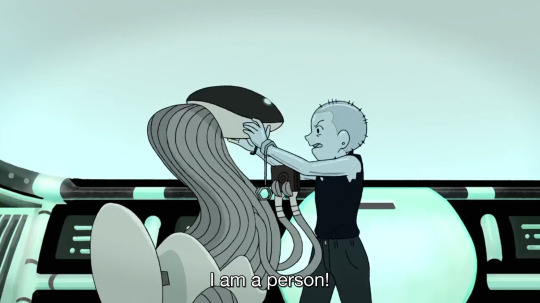
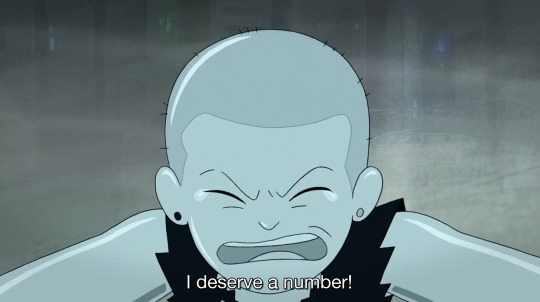

Naturally there's a vast well of potential metaphors that apply here, superimposed on each other and difficult to isolate, but I've been enjoying the interpretation that Mirror Sheriff posed last episode: MT is not a main character and therefore does not get an arc or growth.
Through that lens, this book is a story about stories. The traditional narrative structure would have us believe ALL obstacles are there for conflict, ALL characters exist for a reason, and the story ends when something is learned or changed.
within this framework, MT is the Very Special Episode Guest Character, who exists to act out a marginalized story for the sake of the characters who get their names in the credits, leaving behind nothing but William Shatner idly speculating "but what of Lazarus?" as we pan to an exterior shot and the credits roll.
MT rejects that role. Obstacles and foils aren't there FOR you. Narrative utility is a useful myth. Stories don't end when a comfortable status quo is attained; they continue with a different lead.
#Reminds me of my favorite Jasper Fforde quote: “If the real world were a book it would never find a publisher.”#sms watches infinity train#infinity train 19#infinity train book 2
65 notes
·
View notes
Note
We know JK didnt write the songs from his album, but he made very clear in interviews that he made sure to look for translations of the lyrics and to learn what the songs are saying before choosing them.
Oh so he got all translations and understood very well but still went with those fuck ass songs like 3D ? There's a line between sexy/explicit songs vs vulgar songs. 3D was very vulgar with many appropriate comparisons about women and sex... and JK still chose to sing them and include in his album. Forget they are all about him fucking women and orgasm but I thought he said none of songs is about him personally? Or is 'jikook song' narrative is only when it feeds the delusions ?
I love that this is what is stressing you out🤣🤣🤣
Let's get somethings straight..... pun intended
The Jungkook wrote a het song narrative was beget by you and yours- I and other 'Jikookers' debunked it and Jungkook confirmed our assertion that he DIDN'T write it.
So you and yours delulu point number one.
Check mark please.
Now here you are spinning the narrative into well he understood the lyrics blah blah blah blah 🙄
To that I say, OF COURSE HE DID.
We, the true stans of captain private Jungkook do know, BEEN KNEW, been always aware of the FACT he does check out the lyrics to the songs he covers and sings and he always understands what it is that he sings about or recommends.
Which is why we've always said he's queer coded as fuck because of certain covers certain song choices certain artistic lens and expressional point of views- he may not have written there for you but he sure as hell understood what the song meant its romantic connotations, it's queer artist and its queer codes and he superimposed that on Jimin as the object of his lens.
BOY I'm holding on to something won't let go of you for nothing. I'm running running just to keep my hands on you- is pretty much a rewrite of standing next to you one would say. Or perhaps the vice versa.
Jungkook is drawn to certain themes in music either gay or straight and he's selected one that talks about boy love gay love as layover over a footage of another man he filmed- I'm glad we can agree, you and I that that is something because he is neither ignorant of or stupid to know how such a content would be understood by the General public especially those outside Korea.
So I do agree with you, all jikookers agree with you that Jungkook checks out the lyrics of the songs, that he understands what they mean yadda yadda yadda.
The only delusional person I see here, is the individuals who fail to read any queer meanings into GCF tokyo and the many other queer coded moments of Jikook- wait that's you isn't it?????
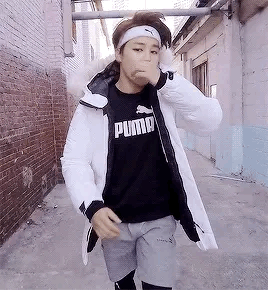
Oh and FYI, we also know he's dated WUHMEN in the past and said he didn't particularly enjoy it or understand what the hype was about and never felt real love while dating the girlies.
Yet I think he found real love with Park Jimin and it knocked him off his feet. Gay love. Mh mh mhh
Love it for him.
Edit: and in case you missed the point here, 3D is a very commercial project not very personal to him. He had to choose and do what will sell....
Compared to a personal projects such as GCF in Tokyo where he didn't care how it was going to be received by fans or the commercial market- hell when he was advised to choose another member to generate clout and buzz he refused. He chose a gay song for that instead to promote same love.
That's how personal it was for him. No?
So there's that. What do you think about that too?
57 notes
·
View notes
Text
In the SMRPG remake, Geno is still around for the postgame fights. Here's a simple and awesome way they could explain that.
(I SO hope they do something even loosely resembling this. I have so many feelings, I made gifs about it.)
Up to this point, we know that there'll be post-game content where you get to fight bosses over again. And look, our blue guy, there he still is!
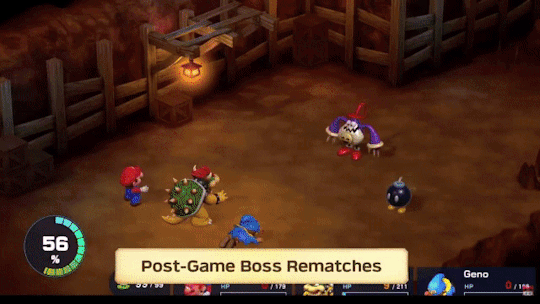
From this, it's safe to assume that in the remake, after Geno leaves to repair the Star Road, he turns right around and comes back.
Which is KIND OF A BIG DEAL. Because in the original game, it's heavily implied that for all practical purposes, he's certain this goodbye will be forever.
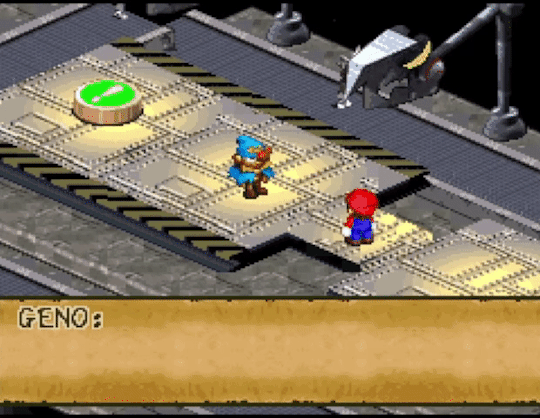
(😭)
For some time, I've had a little theory. I kind of desperately hope for some version of it to be part of the remake. Here it is:
Due to the events of SMRPG, ♡♪!? gets a merit promotion. Maybe, at the beginning of the story, he's not a full-blown Star Spirit (or whatever verbiage). But - as the one little star guardian valiant and capable enough to go down to the world to help save the entire Star Road - now he's become one!
And that comes with more freedom. Just imagine him crashing back down to Earth like "Yo GUESS WHAT PEOPLE, now I'm a STAR SPIRIT (or etc.) and I set my own schedule!" He can go back and see his friends! It's amazing!
And it fits exactly! With not a single caveat I can think of!
IN FACT, you might even say it's supported by a little discrepancy in some 27-year-old pixel art:

Remember the difference between Geno's first appearance and his last? He goes from this tiny lil twinkle guy... to a much bigger 5-pointed star. This is never explained....
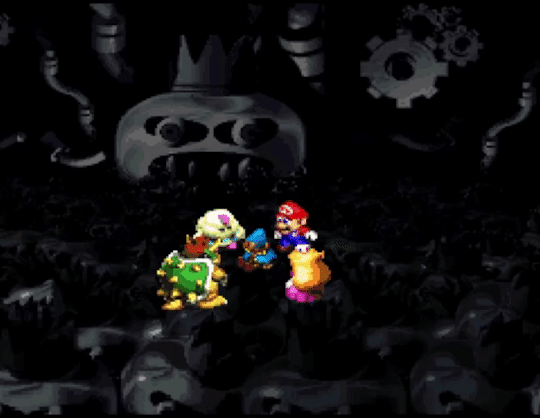
((( Read on for my rationale, more gifs, and even more feelings )))
(the doll being bigger is not explained either, but humor me)

(and yes that IS him lighting things up like the Main Street Electrical Parade. I noticed that almost exactly a year ago and it rocketed this fandom back to the front of my So Cal Disney Kid brain so hard that I can't believe it took me so long to make this blog)

(only fitting that he would also usher in the remake reveal after an end like this. :'''D)
... But to me, it seems plausible that the little star's gotten stronger and grown! 💙
In the remake trailer, because I'm the kind of dweeb who does this, I went frame by frame trying to spot any telling differences -

(^ the scene where he's possessing the doll - this could just be a homage to the little twinkle he looks like in the original. even if that's all, I love the devs for it)
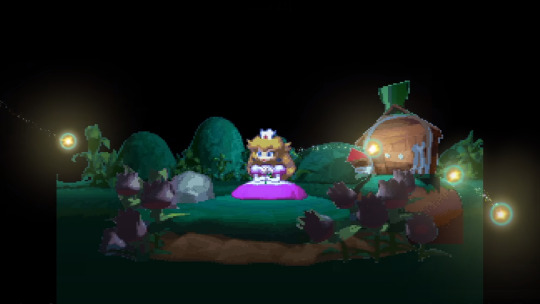
(more five-pointy? maybe? rev, did you just superimpose all the frames where Geno looks most five-pointy just so you could not quite prove anything? ABSOLUTELY)
Make of that what you will; all I can say so far is that we only see him kind of blobby. But what I'm secretly hoping is, maybe that's on purpose, so they can make it clearer in the game for the purpose of some big reveal like this. 😀
Anyway...
Wouldn't this be such a fitting and meaningful thing for Geno's character arc? I know one of the complaints among people who consider Geno overrated is that he doesn't really have an arc. Of course, his fans (myself included) either aren't bothered by that, or straight-up disagree, since he's central to the entire plot and goal of the game, and also literally the Mario universe equivalent of an angel, and maybe he was so reserved because he was trying so hard not to get attached even though we all know he totally did,
and also if he got an arc anywhere near Mallow's he'd be so compelling that he'd basically be the main character and they'd have to call it Super Geno RPG BUT ANYWAY,
I can't fully express, no matter how long I make this post, how much I hope they take a narrative route like this. It would be the actual best. My nerdy little heart would never be the same.
#in this essay i will#geno#geno smrpg#smrpg#super mario rpg#smrpg remake#my headcanons#my wishes#gif#my gifs#please nintendo please#i made so many gifs for this
74 notes
·
View notes
Note
I neeeed to know what made you drawn to serennedy? Besides them being super adorable together ofc
Detailsssss?
God, it's so much.... It's the Prince Charming of it all, the way Luis is so flirty and Leon is so annoyed, the way Luis needs someone to trust him, the way Leon needs someone to trust. It's the way Luis sees this sad beautiful man and immediately superimposes his romantic knight story narrative over their interactions, and the way Leon grudgingly humours him. It's Luis' exuberant interjections during their shared fights, how when he's there things seem less bleak - to the player, sure, but by extension to Leon as well.
That's what drew me to them, the way having Luis there brings out something in Leon. Luis gets under his skin - in an annoying way at first, but as their paths continue to cross you can see Leon beginning to like him, to wonder about him, to get answers he doesn't like and to reconcile himself to them. They talk. They share a burning desire for things to be different, for a chance at a better future than the horrors roiling in their pasts.
It's the "Whew, I got a little too into that!" at the shooting range. It's the way Luis leans back and crosses his legs and cocks his hip and tilts his head and shoots Leon the filthiest look. What else am I supposed to do with that but ship it??
It's-- Man, it's Leon lighting Luis' final cigarette. They might as well have had sex on screen, that's how intimate and tender that was. It's Leon squeezing Luis' hand when he's already dead. It's-- What if they had half a chance?
And all of that is just the tip of the iceberg, pal! I'm unwell about them and I have been since the moment Leon ripped the packing tape from Luis' mouth. Thanks for asking!!
44 notes
·
View notes
Text
now that i’ve deferred because a uni degree is nothing but an entrance ticket into moderate financial security and not worth utterly obliterating my mental health over i am compiling my own curriculum. all the posts i’ve ever tagged with #ref because they contain essays articles and other texts that i want to read but have never gotten around to, all that goes on the list. around fifty academic articles and book chapters downloaded onto my laptop from jstor while i still have access to it, tailored to fit my personal interests.
rearranging my self-education. little mx autodidact. carving out a passage through the brambles with a freshly sharpened machete. make no mistake, the thorns are piercing and will continue to tear at my exposed limbs, but the pain is worth the fruits of knowledge at the end, real knowledge and not something superimposed from above. i know, i know, undergrads aren’t afforded that freedom of narrowing our study, it’s something earned with time and effort and only fully permitted at a “higher” level of education, but who determines these levels?
it sounds silly and rash, but it’s a long-deliberated decision. the university environment is not right for my weird brain despite my literary inclinations, and i prefer to select my own path towards learning while working a low paying job on the side. perhaps i’ll return in a year’s time after all, matured and mellowed, hardened or roughened with real-life experience and online self-teaching, to pursue liberal arts as the most, well, liberated pathway. maybe not.
maybe if i had gone to one of those colleges where they allow you to pick and choose your own modules for your degree entirely (like one of the people that i most admire on this website did in its time) things would have gone down differently, but alas. let the world keep turning and let everything that serves no purpose any longer decompose and compost into something new .
“what has this got to do with autism?” you may ask, “i’m autistic and i completed a normal bachelors’ degree just fine.” your answer: having been in a place of moderate autistic burnout for years that abruptly turned severe in the past few months, my bodymind has shifted into what is known rather disparagingly under the medical model as “autistic regression” or “regressive autism”: a gradual distancing further and further away from accepted neurotypical standards of moving through and navigating the world around me.
one of the ways in which this unmasking presents itself, apart from the more noticeable characteristics such as outwardly visible stimming and a complete absence of eye contact, is a total inability to focus on, be motivated by and/or engage in any (textual, literary, cinematic etc etc) materials that do not connect at least tangentially or superficially with my special interests (that being ghosts/hauntings, hauntology, folk horror, lovecraftiana/cosmic horror, horror in general, the gothic, neurodiversity, alternative music; narratives/storytelling, folklore/fairytales; queer theory; carceral abolition and liberation; and a few other subjects here unlisted). according to normative capitalist logic of usefulness and productivity, that makes me “severely disabled” by virtue of “restricted interests”. i would say it makes me a interesting person with tall twisted tales to tell, but nevermind that silly nonsense, it’s a mad person speaking.
at this present moment i have no motivation, wish nor desire to continue wasting time and energy attempting to study and remember things that do not connect with the key concepts that my mind is constantly orbiting around. if that makes me incurious or annoying or limited, so be it — this neurological difference affects every aspect of my personality and i do not wish to change it. if the world around us refuses to change, we must either alter it ourselves or construct our own pathways out of the shadows and into the moonlit garden.
#thank you cavar sarah for directly/indirectly inspiring me to make this (highly personal yet hopefully informative to some?) post!!#@librarycards on here#aer writing on transMadness and adjacent topics gives me life and constant material for thought and consideration#jamie.txt#uniposting#autism#actually autistic#neurodiversity#neuroqueer#autpunk#disability#autistic#autism acceptance#college dropout#autistic burnout
50 notes
·
View notes
Text
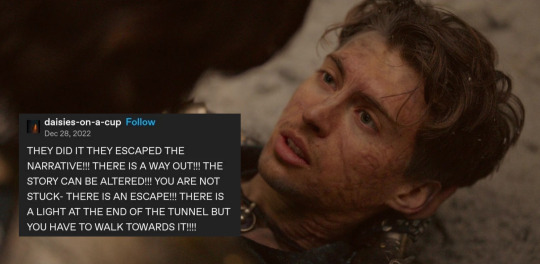
[ID: screencap from willow 2022 of a newly revived non-evil airk in the immemorial city. superimposed text from tumblr user daisies-on-a-cup reads: THEY DID IT THEY ESCAPED THE NARRATIVE!!! THERE IS A WAY OUT!!! THE STORY CAN BE ALTERED!!! YOU ARE NOT STUCK- THERE IS AN ESCAPE!!! THERE IS A LIGHT AT THE END OF THE TUNNEL BUT YOU HAVE TO WALK TOWARDS IT!!!! /end ID]
39 notes
·
View notes
Text
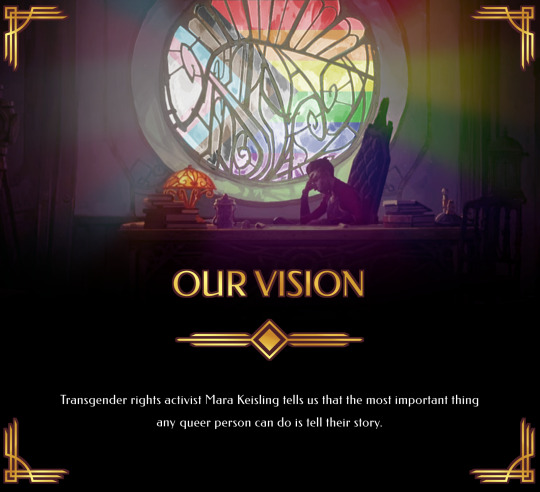
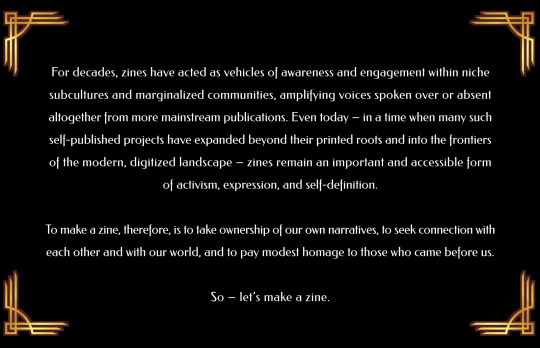


[Image ID: a set of 4 images, all with a black background and golden art deco graphics in the four corners. The first one features an altered screenshot from Arcane - Silco sitting in his office with his profile to the camera. Behind him is the large circular window. An inclusive LGBTQ flag is superimposed behind the window and colourful rays of the rainbow spread over the image in low opacity. Golden text in an art deco font reads: OUR VISION. The rest of the images feature white art deco font text that read the text featured in full below. The last image features the SILCO QUEER ZINE logo in gold and rainbow colours and art deco font on the bottom centre. /end if ID]
FULL TEXT:
OUR VISION
Transgender rights activist Mara Keisling tells us that the most important thing any queer person can do is tell their story.
For decades, zines have acted as vehicles of awareness and engagement within niche subcultures and marginalized communities, amplifying voices spoken over or absent altogether from more mainstream publications. Even today – in a time when many such self-published projects have expanded beyond their printed roots and into the frontiers of the modern, digitized landscape – zines remain an important and accessible form of activism, expression, and self-definition.
To make a zine, therefore, is to take ownership of our own narratives, to seek connection with each other and with our world, and to pay modest homage to those who came before us.
So – let’s make a zine.
This month, we are opening applications for contributors to the maiden voyage of the Queer Silco Zine; and would like to invite the Arcane fan community to join us at the figurative table. Together, we aim to create a feast of unabashed queer existence, using the character of Silco as the lens of our collective thematic focus.
The goal of this project is not to limit or rigidly define the meaning of the term 'queer'; nor will we profess, or even foolishly aim, to document every possible nuance nested beneath the broad umbrella of queer identities and experiences. Rather, the Queer Silco Zine is a passion project by and for queers – as well as by and for the people who love us – simply to share our space, tell our stories, and pay tribute to the vibrance and variety of our queer lives. While we can’t hope to portray every facet of our community’s collective experiences, we hope at least that others will see pieces of themselves reflected in the finished zine’s pages.
We hope too that that will be as valuable to them as it is to us.
Silence is death; and to exist proudly is to resist loudly. We believe that, in sharing community, we persevere and thrive -- brothers and sisters (and siblings) back to back against everything the world throws at us.
#arcane#silco#silco arcane#silco fanart#silco fanfic#silco league of legends#lgbtq#lesbian#gay#bisexual#trans#queer#aromantic#asexual#nonbinary#zine
77 notes
·
View notes
Text
unintelligent characters
I feel like nooo one is gonna get what Im saying and maybe Im crazy but I wish we would let characters who are dumb stay dumb. Not talking about characters who are "dumb" in the way that they jus dont know thinks like a child would. Not like naive... Just characters who aren't the most intelligent.
Like i have no clue how to articulate this because I'm not a psychologist but sometimes i feel like we as a community (broad and vast) take characters who are not all up there and fanonly make them secretly really bright, or smart, or like make it so their "dumbness" is actually a front. I'm talking specifically about men or boy characters.
I especially see it when it comes to those particular "dumb" characters are given relationships...It's like people cannot fathom people who AREN'T secretly really emotional intelligent having meaningful relationships outside of just bros. Especially in queer spaces......And like I don't just mean book dumb, or whatever, but characters you might write off as being an "npc" w no internal monologue if you knew them irl 😐
To me expanding on those kinds of characters has become interesting just because I feel like we've made it so those types of people aren't actually SEEN as people 😭 so I never see it anywhere represented in fictional characters. They're always used as some kind of narrative prop, and if the fandom decides they like the idea of them, they're given superimposed secret depth and they're Actually super smart and bright and deep
One character I think that fits this is Jason Mendoza. I have noo idea how the fandom interacts w him bcz Im not in it but I like his character a lot 🙌He's not exactlyyy the kind of character Im thinking of but like he's close
#Just Chatting#i feel like im gonna get jumped if i said who this post was abt#kind of about more than one character but they inspired it#DOES ANYONE HEAR ME#CAN ANYONE HEAR MEEE
17 notes
·
View notes
Text
JAIME IN THE RIVERLANDS I: Exploring the 'Limits of Redemption'
Or: I HATE YOUR JAIME META AND HERE'S WHY
[Note: So this long fucking post is actually only the intro to what is (I think) a three/four part essay; the other parts are in editing stages at the moment but I figured if I don't post the first part now it'll be a WIP forever. Hopefully the rest will follow relatively soon as I'm literally sitting around with covid rn doing approx. nothing else but whatever watch this space I guess. anyway]
“I want there to be a possibility of redemption for us, because we all do terrible things. We should be able to be forgiven. Because if there is no possibility of redemption, what’s the answer then?” George R. R. Martin (!!!)
‘Redemption’ is broadly considered to be the most significant theme in Jaime Lannister’s narrative, with most arguing that the conclusion of his story must reach one verdict or another in terms of whether he has achieved it. For those that believe he won’t, Jaime’s chapters in AFFC and ADWD are most commonly used as evidence.
However, Jaime’s Riverlands arc (which I will here distinguish as beginning in Jaime III AFFC, and ending in Jaime I ADWD) is one I think is too often broken down and compartmentalised, with few takes managing to consider it holistically. Scenes are often isolated from their context and from the preceding and succeeding chapters, with fans nonetheless reaching their verdict on Jaime’s broader story based on this limited analysis. So the arguments go, here’s Jaime doing bad things and fighting for the wrong side after all he went through in ASOS: after choosing to change, and then failing to do so. If Jaime truly wanted redemption, why is he still fighting for the Lannister regime? Why are all his efforts for good so pitifully small-scale?
Here I want to consider this arc not just through isolated scenes, but within the broader narrative of Jaime’s story. For, as with everything else, GRRM is rarely interested in presenting a straightforward story of its type: Jaime’s struggle for redemption in the Riverlands is treated with as much complexity as other arcs in the story, such as Dany’s governance in Meereen, or Jon’s on the Wall. Characters are often trapped by circumstance, forced to compromise or made to contradict their own ideals in an effort to achieve their goals. The result can be ugliness and strife where a reader expects catharsis. In a series with two volumes to go, this is not to say that catharsis won’t come for Jaime’s story, but its delayed arrival has seen fans frequently contrast it with another POV: Theon’s.
Theon is another character for whom redemption is a guiding theme, though his is often favoured above Jaime’s owing to the more straightforward catharsis it affords. When we last see Theon in ADWD, he has fought sizable demons (both internal and otherwise) to escape Winterfell and save Jeyne Poole in the process. From here, a reader anticipates Theon will continue to fight for the right causes, and carve out a new identity separate from that as Balon’s heir, or Ned Stark’s hostage. No reader expects that Theon will turn around in TWOW to return to his old ways, because he has no cause to look back: the work is done, his old trappings gone, and the only direction left to him is forwards into something new.
Theon’s arc begins slightly ahead of Jaime’s, kicking off in the second volume where Jaime’s gathers pace in the third, but even accounting for this variance in pacing, the differences between their two redemption stories are notable. Theon begins the series as a relatively isolated character, estranged from his family and superimposed into one where the patriarch might take his head at any moment. For the most part, it doesn’t seem as though anyone even likes Theon all that much, apart from the mother he has largely forgotten about. It’s unsurprising, then, that over the course of several conflicts in ACOK we see Theon’s ties and allies diminished to practically nothing: he’s abandoned by his own house, becomes an enemy of the Starks, and is kept hostage by the Boltons who view him as a useful piece of dirt.
Theon is ultimately removed from grander disputes besides as a pawn, too afraid to claim his autonomy for fears of painful consequences from Ramsay. He remembers his wrongs, but feels helpless to atone for them, left instead to ruminate in Winterfell. Theon’s redemption is then pursued through courage and reclamation of identity: a growing irrelevance to the new powers of the plot, his story is to reclaim his name and autonomy in the background, acting not for any house or name, but on his own renewed instincts for right and wrong. No family or political cause is left to rely on him, and so Theon ironically has the freedom to act on a purely individual basis, fighting instead for the single person who does need him now: Jeyne Poole. His act of heroism at the end of ADWD carves a checkpoint viewed by most readers as a decisive move towards redemption.
Jaime’s arc and Theon’s have more in common whilst Jaime is imprisoned by the Bloody Mummers in ASOS, where he too relies largely on instincts and courage, and develops the desire to change through tormented self-reflection. But the crucial difference is the scope each are afforded from here on. As discussed, Theon, on point of reflection, is essentially alone. The only choices he can make are those he makes for himself, and indeed he has nothing to lose but his life, for even his name has been stripped from him.
This is not so in Jaime’s case. Far from Theon’s reduced existence, halfway through ASOS Jaime has returned to all his old trappings, as well as new positions of power he never asked for. He’s now in a position to make choices that were never his before, whether they concern the makeup of the Kingsguard or the safety of his house, and each choice has a domino effect that can ripple throughout the realm. Indeed, rather than estranged from his family, Jaime is inserted directly into the midst of their affairs - at precisely the time when the threat to their house proves existential. This is not a character who can look only to his own personal hopes, ambitions and wellbeing for guidance - rather, this is someone in a prime seat of governance. Ironically, this sees Jaime’s personal autonomy greatly diminished as a result.
Not all of this is new, of course. Jaime has been born with stakes in these institutions - or acquired them at 15, in the case of the Kingsguard. The fate of House Lannister has always mattered to Jaime because the Lannisters are his own family, and owing to the precarious position Tywin has left them in, that same family are now in mortal danger. Plenty of words are shed amongst the Lannisters on the importance of maintaining Tywin’s legacy in keeping the security of their House, and unfortunately, Jaime has inherited this legacy at precisely the time he has hoped to escape it. Though he emerges from ASOS with personal ambitions to rescue Sansa, become a knight like Brienne, reclaim his fatherhood to his children and restore peace in the realm, what he wants has to be balanced alongside the security of the Lannisters collectively, and the delicate regency that sustains them.
As Ned tells Cersei as early as AGOT, there is no safe escape for House Lannister now: Robert would’ve hounded them to the ends of the world if he knew the truth, and certainly by AFFC both highborn and smallfolk alike long for their downfall. It is here that Jaime finds himself upon his return to King’s Landing. So from ASOS onwards, we see Jaime attempting to continue the arc he began with Brienne, and struggling to do so within the confines of his new elevated roles, risking undermining his family even as they undermine him at every turn. What deeds he does manage, such as instigating rescues for both Tyrion and Sansa, need to be done covertly, whilst everything he does in the public sphere is subject to Cersei’s whims.
By Jaime III AFFC, Cersei declares that Jaime’s role now is to restore peace in the Riverlands (that is, to quash the Tullys), and Jaime, reluctantly, gathers his men and goes. So begins a balancing act between his private ambition and public persona, where he knows the slightest misstep might be the downfall of his family.
(Of course, the grim truth is that the fate of House Lannister was sealed by Tywin long ago.)
JAIME AND THE LANNISTER LEGACY
As mentioned, readers often simplify all this to argue that Jaime is simply fighting for ‘the Lannister regime’ in AFFC; that he is flying the colours for his family because that’s the easier thing to do than pursue redemption and the greater good. I’d disagree.
Firstly, we should note that Jaime has always had a healthy disregard for Lannister rhetoric and his father’s view of the world. This is not to say Jaime is not aware of the power his name holds, and that like his brother Tyrion, he won’t use it occasionally as a crutch, performance or excuse:
"White is for Starks. I'll drink red like a good Lannister." [JAIME V, ASOS]
"If you know me, Urswyck, you know you'll have your reward. A Lannister always pays his debts.” [JAIME III, ASOS]
He was a Lannister of Casterly Rock, Lord Commander of the Kingsguard; no sellsword would make him scream. [JAIME III, ASOS]
That would show the realm that the Lannisters are above their laws, like gods and Targaryens. [JAIME III, ASOS]
“The Father Above has more time than I do. Do you know who I am?" [JAIME IV, AFFC]
And to say the least, Jaime is no stranger to a gold plate armour. Simply put, this is a character quite capable of talking the talk and walking the walk when it suits him, but his broader POV shows one far more sceptical than Tywin or Cersei.
To start with, Jaime actually shirked his lead role in House Lannister at fifteen, giving up Casterly Rock and the propagation of his house for the promise of his sister’s love. He declines Tywin’s offer to restore him to this position in ASOS (even despite his disillusionment with Cersei) and immediately sets about undermining both his father and sister by rescuing Tyrion and Sansa. Jaime has also from a young age rejected Tywin’s diatribes on his brother, spending his life regretting the one instance he aligned himself to them (see: Tysha). As a young Kingsguard he does not advocate allowing Tywin into the city, even knowing his father would win decisively, does not join his father at the last minute either - and in fact did not even raise Tywin as King given ample opportunity:
"Shall I proclaim a new king as well?" Crakehall asked, and Jaime read the question plain: Shall it be your father [...]?”
[...]"Proclaim who you bloody well like," he told Crakehall. Then he climbed the Iron Throne and seated himself with his sword across his knees, to see who would come to claim the kingdom. [JAIME II, ASOS]
At this crucial moment, Jaime adopts a neutral stance, leaving the politicking to other men - and this is a stance that comes to define him up to AGOT: given all he has seen, Jaime no longer has faith in the rights of Kings nor the honour of good men, and so retreats inward where the only rules are his own. Ultimately Jaime’s natural inclination is to stand as an individual: for his own values, rather than as a representative for his house or any institution.
And his general disdain for his father’s doings and teachings is seen everywhere in his POV - or occasionally, by omission. Whilst Cersei and even Tyrion frequently reflect on Tywin’s methodry and lessons, Jaime, the key subject of those lessons, seldom considers them - except with resentment or reluctance:
"Father," he told the corpse, "it was you who told me that tears were a mark of weakness in a man, so you cannot expect that I should cry for you." [JAIME I, AFFC]
Indeed, in much of AFFC we see Jaime wandering the Riverlands, disturbed by the ruins his father’s campaigns have left behind. This is a character reiterated throughout his POV as one who runs on passion: he entered the war for Cersei and Tyrion, albeit recklessly and in the midst of a conflict of his own making. Meanwhile, Tywin’s work is cold-blooded, calculated and brutal, and reminds Jaime of his enemies rather than his allies.
In fact, the only aspect of House Lannister that Jaime seems especially concerned with seem to be his loved ones within it. In the beginning this appears largely limited to Cersei and Tyrion, the two he asks after when seeking news from Catelyn. News of a distant uncle and his losses at war are dismissed out of hand, and Tywin himself is asked after as essentially an afterthought:
"It's Cersei and Tyrion who concern me. As well as my lord father." [CATELYN VII, ACOK]
Later, of course, we encounter family like Genna and Daven representing Jaime's broader emotional stakes within his house, and his growing cares for his children make him more intent on its survival. But his remote affection (or entire lack of it) for his own father never seems to waver.
When Tywin does die, we see Jaime holding vigil beside his corpse out of a sense of obligation as Tywin’s son, but after spending much of it scowling at Tywin’s corpse and thinking ill of him, he abandons the vigil early to chase after a distraught Tommen. In the same scene, we even see Jaime attempting to counsel his son differently to how his father did him: where Tywin taught Jaime a man does not cry and should never show weakness, Jaime does not ridicule his son’s distress (as Cersei notably does), but tries to offer him support (albeit with only a sad coping mechanism of his own):
"A man can bear most anything, if he must," Jaime told his son. I have smelled a man roasting, as King Aerys cooked him in his own armour. "The world is full of horrors, Tommen. You can fight them, or laugh at them, or look without seeing . . . go away inside." [JAIME I, AFFC]
In short, Jaime has no apparent interest in upholding his father’s teachings or values, and all signs point to a man who hopes to raise his son differently, to undo cycles of tyranny, and to begin anew. This is all sadly compounded by the inheritance Tywin has left behind.
TYWIN'S LEGACY
Jaime’s nobler intentions unfortunately have little place for manoeuvre in the preservation of House Lannister. In fact, the family are essentially left with two options: they can sustain the 'Lannister regime', or they can vanish completely - and the latter isn’t altogether realistic for the most famous family in Westeros, in a narrative that always strives to be.
So for the Lannisters to maintain their security, they are left with largely the former - maintaining the outward appearance of power that Tywin has fostered for his house. The trouble is that maintaining that appearance, when it was previously sustained by the severity of the actions one man was willing to take.
Since he rose to the head of his family, Tywin has ruled by fear: he has made enemies of powerful people, false friends of others, and they only cower because of the ultimate threat that Tywin has showed more than once that he can act upon - given cause, he will demolish a house completely. Tywin’s method essentially runs opposite to his father’s: where Tytos offered lenience, Tywin determines to offer none: you are with him, or you are nothing.
Whilst this has been effective in removing smaller targets such as the Reynes and Tarbecks, it has done outsized damage in ruining the good faith and trust that others might have in House Lannister: certainly a Lannister will pay his debts, but what it takes to accrue one is the fear that Tywin rules with.
Tywin’s demolition method was attempted on House Stark in ASOS, and by AFFC, it may seem to have been successful on the surface level. The northern forces are in pieces, the Lannisters are allied to the Tyrells, and there is a new Lannister king on the throne. The threats from overseas seem vague and obscure, and Tommen holds tomorrow.
But of course, this is not actually the case. Sansa is not dead, nor Arya, nor Bran and Rickon. They’ve survived through their parents’ memory and teachings, and their father’s vassals are already conspiring the Starks’ return to the north. It goes without saying that the power of Winterfell is sustained through security and loyalty, not fear, and that fear is infinitely more fragile, with a great deal more work required in sustaining it.
Of course, Tywin's reasons for ruling with fear are, despite his pretences, rooted in his own feelings of inadequacy rather than political practicality: this is a man who has grown up feeling humiliated and undermined by his own father, and is desperate to regain the power and respect he believes he's entitled to - by any means necessary. Still, such is the state of the legacy he leaves behind for his own son: an unsustainable campaign of fear, with no-one left to uphold it:
Tywin was big even when he was little." She gave a sigh. "Who will protect us now?"
Jaime kissed her cheek. "He left a son."
"Aye, he did. That is what I fear the most, in truth."
That was a queer remark. "Why should you fear?"
"Jaime," she said, tugging on his ear, "sweetling, I have known you since you were a babe at Joanna's breast. You smile like Gerion and fight like Tyg, and there's some of Kevan in you, else you would not wear that cloak . . . but Tyrion is Tywin's son, not you." [JAIME V, AFFC]
Ironically, what is here identified by Genna as a weakness of Jaime’s is really a weakness of Tywin’s. He has an heir who might have carried the torch forward for House Lannister, might just have managed to build enough bridges for whichever Lannister came next… but Tywin’s view of the world is such that that heir is an abused, embittered man more interested in their downfall. The force that might have once sustained them will now be turned against them as Tyrion joins with Daenerys Targaryen - and regardless, whatever progress and good faith Tyrion fostered for House Lannister in ACOK was quickly undone by Tywin in ASOS with the Red Wedding.
So what’s left is only a hopeless, toxic mess: House Lannister has no true friends and no true allies. They have only a host of enemies, small and large, who desire the utter demolition of a house that sought the same of others. And the man left to carry the torch is one without conviction in anything it stands for.
Nonetheless, the torch still rests with Jaime, with the stakes high as they’ve ever been for he and his loved ones. In AFFC, GRRM shows Jaime attempting a performance as Tywin’s heir, all whilst giving away vital ground, leading without conviction and resenting his role. By the end of ADWD, Jaime will have all but abandoned the Lannister cause for the pursuit of redemption, and the collapse of his house will enter overdrive.
[PART TWO: Bluffs, Bargaining & Baby Trebuchets - Why Jaime Can't Win in the Riverlands]
#jaime lannister#asoiaf#valyrianscrolls#long post#this is probably preaching to the choir for most of my followers but I think like#at this point I've read too many riverlands essays that I feel miss the point entirely so might as well make my own
150 notes
·
View notes